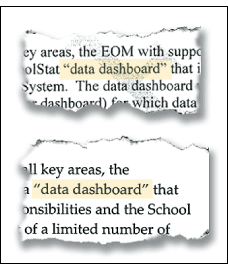 Washingtonpost.com
Washingtonpost.com
District of Columbia mayor Adrian Fenty’s administration has been caught plagiarizing. Oops!
Victor A Reinoso, the deputy mayor for education, lifted phrases and ideas from other school districts when compiling a 31-page plan to improve the performance of students in DC schools, according to the Washington Post. The paper reported that 32 percent of the school plan was borrowed illegitimately.
Reinoso said in a statement:
“In my eagerness to compile a compendium of successful reform initiatives, plans and best practices, I didn’t properly attribute educational sources. . . . I am hopeful this oversight doesn’t diminish the public’s perception of the Administration’s intent and ability to successfully manage and reform the District’s Public School System.”
The most vocal critics of Reinoso’s actions claim that he should have tailored his recommendations to fit DC schools; among other differences, the DC system is less than half the size of the Charlotte-Mecklenburg, N.C., school system from which many of the plagiarized passages originated.
My biggest worry with this is not that the plan “doesn’t fit” the DC school district. After all, more than 60% of the document was original. But if the people in charge of the schools can’t figure out the concept of academic honesty, how can students? Or rather, how can teachers, who can’t possibly be blamed for the actions of a city official, expect to have power to punish plagiarists if this sort of thing is running rampant at the administrative level? Are we, as I’ve suggested before, thinking we’re sliding down an ethical slope to a point where plagiarism is a fact of life–or is it a move toward the utopian free exchange of information?
I also can’t help but wonder if people would still be complaining that the plan was not unique to the District if Reinoso had properly attributed his sources. After all:
In Fenty’s document, with “DRAFT” stamped on each page, strategies to create reading and math classes for middle school students, recruit teachers and use “secret shoppers” to judge how parents are treated by school employees come directly from the Charlotte-Mecklenburg plan.
The administration’s proposal for a “data dashboard” with statistical indicators to enable “the public to see, at a glance, whether current improvement efforts are on track and to respond appropriately when problems arise” is lifted from the Charlotte-Mecklenburg document.
These sound great! The Charlotte-Mecklenburg plan, which took over 100 days and 500 parents, teachers, and consultants to compile, should be emulated. Of course, the full document probably has more details that should be tailored to fit the school system, but there’s nothing wrong with borrowing good ideas. And citing their sources.
Among the follow-up articles today is this profile of the guy that ferreted out the plagiarism.
[…] January 17, 2008 It’s funny that people think in the age of the Internet, you can plagiarize and it won’t be noticed. All it takes is one person to notice, and since the blogosphere loves outing plagiarists, […]